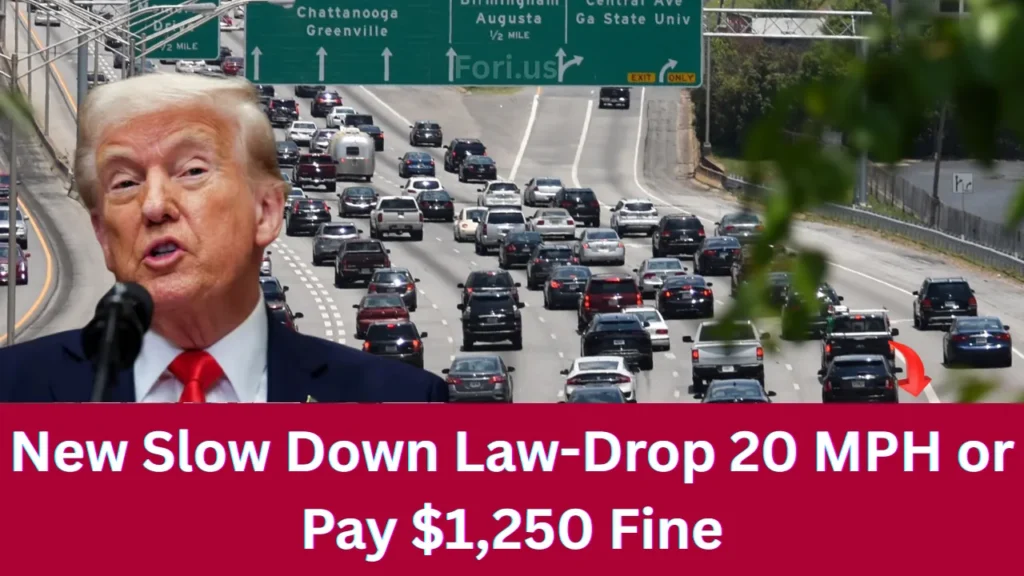Texas drivers are facing a major update to traffic rules with the arrival of the New Slow Down Law. Starting September 1, 2025, motorists must reduce their speed by at least 20 miles per hour when approaching flashing lights on the roadside. Failing to follow the rule will bring steep penalties — including a fine of up to $1,250 for a first offense.
This law expands protections for roadside workers, law enforcement, tow truck drivers, and other service providers who face danger from fast-moving traffic every day. The changes mark a stronger effort by the state to curb reckless driving and improve safety.
5 Major Social Security Changes That Affect Your Benefits
New Slow Down Law: $1,250 Fine Begins This Month
| Law Name | Texas Move Over or Slow Down Law (Senate Bill 305) |
| Effective Date | September 1, 2025 |
| Main Requirement | Drop speed by 20 mph near flashing lights or move over safely |
| First Offense Fine | Up to $1,250 |
| Serious Violation | Up to $4,000 fine, criminal charges, or jail if injury/death occurs |
| Protected Workers | Police, EMS, tow truck drivers, utility and service workers |

What the New Slow Down Law Means
The New Slow Down Law is part of Texas Senate Bill 305. It builds on an existing rule requiring drivers to move over or slow down for police and emergency vehicles. The 2025 version goes further by including tow trucks, TxDOT vehicles, utility service trucks, garbage trucks, and even parking enforcement vehicles.
The rule applies to all highways and multi-lane roads across the state. Drivers who fail to act responsibly when passing flashing lights risk heavy financial penalties and possible criminal charges.
Social Security Will Change Forever on September 30-It’s Official
How the Law Works in Practice
Drivers now face two clear options when approaching flashing lights:
- Move over: If it is safe, shift one lane away from the stopped vehicle.
- Slow down: If changing lanes is not safe, reduce speed by at least 20 miles per hour below the posted limit.
For roads with lower limits, the law is stricter. For example, if the posted limit is 25 mph, motorists must slow down to just 5 mph. The goal is to provide extra protection to roadside workers who operate in dangerous conditions.
Penalties Under the New Law
The penalties for violating the New Slow Down Law are some of the toughest in Texas traffic history:
- First Offense: Fine of up to $1,250.
- Severe Cases: If a driver violates the rule and causes injury or death, the fine can increase to $4,000, with added criminal charges and potential jail time.
These penalties reflect the seriousness of the law. Texas leaders argue that strong consequences are necessary to change driver behavior.
Medicare Savings of $2,400 Often Go Unclaimed Each Year
Why the New Slow Down Law Was Needed
Every year, roadside workers in Texas are injured or killed by drivers who fail to slow down or move over. Tow truck drivers, TxDOT workers, and emergency responders often risk their lives while assisting stranded vehicles or clearing accidents.
Governor Greg Abbott signed the bill earlier this year to address these safety concerns. Expanding the list of protected vehicles shows that the state wants to safeguard all roadside employees, not just law enforcement or paramedics.
Other Driving Laws Introduced in Texas in 2025
The New Slow Down Law is not the only update for Texas drivers in 2025. Several other changes are now in effect:
- Bandit signs crackdown: Businesses placing illegal roadside advertising face fines up to $5,000.
- Expired driver’s license grace period: Drivers who already scheduled a renewal have 60 extra days.
- Tougher DWI rules: Higher fines, longer suspensions, and felony charges for repeat offenders.
- Autonomous vehicle rules: Companies must obtain state permits and show emergency response plans.
These laws demonstrate Texas’s broader effort to promote safer driving and reduce risks for all road users.
How Drivers Can Stay Safe and Avoid Fines
To avoid penalties and keep roads safe, Texas drivers should:
- Watch carefully for flashing lights on highways and city roads.
- Always be prepared to move over a lane if space and traffic conditions allow.
- Reduce speed quickly and safely when moving over is not possible.
- Stay alert for utility trucks, garbage trucks, and service vehicles, not just police or ambulances.
- Remember that fines for violations are steep and can impact both finances and driving records.
The Broader Impact of the Law
The New Slow Down Law reflects a larger trend across the country where states are strengthening protections for roadside workers. With distracted driving accidents increasing in recent years, tougher laws aim to prevent tragedies and encourage safe driving practices.
For Texas, the law also highlights the state’s commitment to reducing preventable deaths and injuries on highways. It is a reminder that safe driving is not just about following rules — it is about protecting lives.
US Bank to Close 40 Branches Across 16 States in 2025
FAQs About New Slow Down Law in Texas
It requires drivers to move over or slow down by at least 20 mph when approaching flashing lights on the roadside.
First offenses carry fines of up to $1,250. Serious violations causing injury or death can result in fines up to $4,000, plus possible jail time.
Police officers, EMS staff, tow truck drivers, TxDOT employees, garbage collectors, and utility service workers are all covered.
It officially took effect on September 1, 2025.
Yes, it applies on all highways and multi-lane roads across the state.
The New Slow Down Law in Texas sends a strong message: protecting roadside workers is a priority. By requiring drivers to either move over or slow down, the state aims to reduce injuries and save lives. With fines reaching $1,250 for a first offense, the law gives drivers every reason to take flashing lights seriously.
For Texans, the best way to prepare is simple — stay alert, follow the rules, and respect the workers who risk their lives to keep roads safe.
